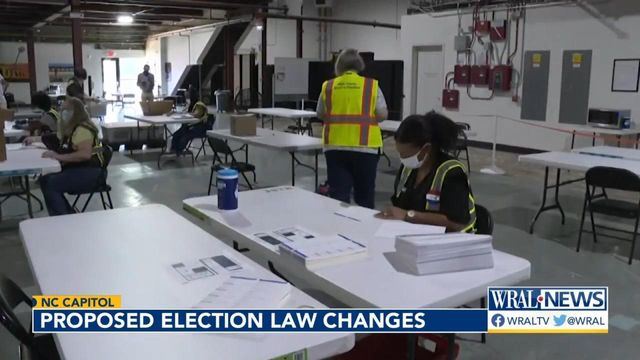New elections bill filed in NC would make big changes for 2024
Republican lawmakers are proposing a sweeping package of changes to state election laws ahead of the 2024 elections — including throwing out any mail-in ballots not received by Election Night, instead of the current three-day grace period after the election.
Senate Bill 747 also proposes more restrictions on mail-in voting, a ban on counties receiving grants to help fund elections, changes to the rules for same-day voter registration, a rule to make it easier for people to formally accuse others of voter fraud, and more.
The proposal also requires elections boards to acquire and use signature verification software for absentee ballots. It would require signature verifications for mail-in ballots — in addition to the current rules that also require two witnesses.
And it makes it easier to remove people from voting lists if they’ve claimed they aren’t a citizen to get out of jury duty.
Republican lawmakers say it’s an effort to increase confidence in the security of elections.
“We cannot afford to do nothing in the face of low voter confidence,” Sen. Ralph Hise, R-Mitchell, a chairman of the Senate Redistricting and Elections Committee, said in a statement.
Making Election Day the official deadline would help reduce confusion and skepticism, said Sen. Paul Newton, R-Cabarrus, also a chairman of the Senate Redistricting and Elections Committee. “It will make for a quicker declaration of winners,” he said in a statement. “... And it helps North Carolina move past each election cycle with confidence, instead of doubt.”
Critics say the effort is intended to disenfranchise Democratic voters. Advocacy groups for senior citizens, for instance, say the signature requirements can lead to disenfranchisement because handwriting changes are common as people age. And the bill’s stricter rules proposed for mail-in voting come after Democrats used mail-in voting far more than Republicans in 2020, which led former Republican President Donald Trump to falsely claim mail-in ballots were rife with fraud.
WRAL News reported Wednesday that Cleta Mitchell, a former attorney for Donald Tump’s 2020 campaign who was involved in the Trump campaign’s efforts to overturn the election results, has been meeting with GOP lawmakers on changes.
Republican leaders have acknowledged they met with her, but have downplayed how influential she was, saying they made the decisions themselves on what would or wouldn’t be in the bill. Democrats aren’t convinced.
“Republican lawmakers want to safeguard their power, not our votes,” Senate Democratic leader Dan Blue said in a statement. “Trump advisors have said publicly they want to suppress minority and Gen Z votes — and that’s who Republicans are listening to. We need common sense rules to protect our democracy from those that have lost sight of the importance of a fair and free election.”
Mitchell made headlines earlier this year, when leaked audio recordings showed she was pushing GOP officials nationwide to make it harder for college students to vote, according to multiple media reports. And while Thursday’s bill does include other provisions Mitchell has pushed for, like looser rules for partisan poll observers, it does not include anything directly targeting college voters.
Mitchell leads the Election Integrity Network, a nationwide group of conservative activists who push for tougher voting laws. She recently moved to North Carolina and has been working on local legislative issues with Jim Womack, a former Lee County commissioner who once ran to be head of the NCGOP and is still active in party politics.
Mitchell declined an interview request but Womack said in an interview Wednesday that the changes they’ve been pushing for are meant not to disenfranchise people, but to help voters have more trust in election security.
“Anyone that is a valid voter ought to vote, and we ought to make it easier for them,” he said. “But we want to make it so … hard to cheat.”
Voter fraud is rare; a 2016 audit by North Carolina officials found just two cases of voter impersonation in that year’s elections, out of 4.8 million ballots cast. But it does happen; in 2018 North Carolina had to re-do a Congressional election because a campaign consultant for the Republican candidate was accused of submitting hundreds of fraudulent mail-in ballots. McCrae Dowless, the accused fixer, died last year while awaiting trial.
In more recent years, election skepticism has grown in part because of disproven election conspiracies and false claims made by Trump and top allies such as Mitchell. Allegations of rigged elections persist in North Carolina even though Trump carried the state, Republican U.S. Sen. Thom Tillis won reelection, and the GOP maintained control of the state legislature and won every statewide judicial race.
Some of the changes proposed Thursday have been proposed in the past, only to be vetoed by Democratic Gov. Roy Cooper. Others are new ideas.
“And here they go with advice from election deniers and fraud perpetrators,” Cooper tweeted Thursday. “Don’t be fooled. This isn’t about protecting elections. It’s about rigging them to help Republicans.”
After the bill was publicly released Thursday, Womack said the bill had much — but not all — of what his group wanted.
“The biggest things we had were same-day registrations, and that’s taken care of in this bill; and poll-observers, which really isn’t in there,” he said. “We’re still going to be working with legislators on that.”
WRAL Capitol Bureau Chief Laura Leslie contributed to this article.













